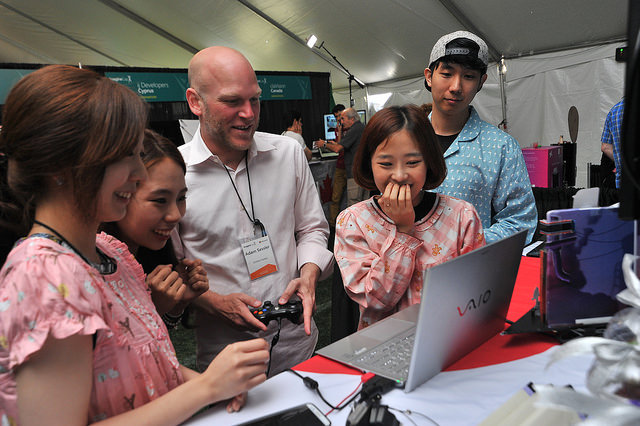
While it was warm and sunny on Microsoft’s Redmond campus Thursday morning, inside the tents set up on the Commons’ soccer fields, it was cool and dark – perfect conditions for the continuing competition of the Imagine Cup World Finals – the hands-on judging round.
Lots of sound effects filled the tent – many emanating from the many games presented by the finalists. But in addition to those electronic beeps and dings, human voices in unison could also be heard above the din: “1-2-3!” – followed by giggles and laughter.
The BOMON team from South Korea, worked as a unified group in presenting their game, “Under Bed” to judges in their category, who arrived one-by-one for 15 minute sessions with each of the teams. Whenever judges had questions for them, they either answered together, or worked together to translate what the judge asked.
And, they all wore pajamas as their team uniform since their game is all about a little girl exploring the “Dust Kingdom” under her bed.
This is the second day of the Imagine Cup World Finals. These 125 students on 34 teams from as many countries had traveled thousands of miles, worked for months on their projects (and pitches) and triumphed over others in their category for this moment in front of the judges. At stake is more than $1 million in travel, cash prizes, hands-on mentorship opportunities and a private audience with Microsoft Founder and Technology Advisor Bill Gates.
BOMON means “spring is coming” – a name this team chose “to give people a fresh feeling of spring.” And their game, despite being about the world beneath a bed, was full of bright colors and whimsical cutesy characters (even the monsters). Their booth also had a full-color mini diorama of the game and its characters, as well as stickers and brochures.
They had their game set up so judges could try it on a tablet, a PC laptop and using a controller. They showed judges their tutorial, which explained the story of Judy and her bunny friend Toto, and how they explore Dust Land, Mold Garden, the Dust Factory and the Dust Queen Palace.
As they counted off the jumps – “1, 2, 3!” with judge Adam Sessler (who hosted TV programs like “X-Play” and “Gamespot TV” about videogames for 15 years), he gave them feedback, such as making a more exciting jumping motion (you can’t always have a live cheering section) and targeting all ages for the game, which now targets kids ages six to 10.
“He really liked our game,” said Boyoung Kim, 23, wearing Hello Kitty pajamas.
The next judge who saw them, award-winning producer Stephanie Brash, let them take her through the game, asking questions along the way about how long they’ve been working on the game, how it ends and how they’re going to pay for it. She also encouraged them to pursue merchandise that could be sold with the game, such as toys and pajamas.
“I’m jumping! I love to go up,” Brash said, of the game
BOMON, altogether: “Up, up, up!”
“I gotta go fast!” After clearing the level, Brash exhaled. “Whew.”
BOMON cheered: “Yeah!”
“It’s a very cute game and a very good demonstration,” Brash told them, as she left. “They’re so enthusiastic!”

Around the corner from BOMON, the four-man Genesis Game Studios team from Greece met with Alexey Pajitnov, the Russian game designer famous for creating “Tetris.”
They showed him “Dementia – Tales of Blackthorn Manor,” an online tactical turn-based, role-playing game. Each player chooses one of 12 characters to explore “The Blackthorn Manor,” a creepy old house filled with deadly secrets. At some point during the game, one explorer will trigger a scenario called a “curse.” When the curse is revealed, one of the explorers becomes a traitor who turns on the others. “Dementia” has 30 different curses, each with their own lore and unique gameplay.
At one scene, Pajitnov told them, “There should be some kind of explanation here,” and would give advice as he played the game, including marketing tips and testing on more players. He also suggested beefing up the multiplayer options so that users could store a game for others to upload and play against.
“He really liked our game, I think,” said Manos Chatziioannou. “That’s a big thing for us. He made ‘Tetris’!”

Pajitnov visited the Liaison Team from Brazil next, who presented him with their eponymous game. It’s a platformer with action and puzzle elements that focuses on the friendship of a boy called Lug and his faithful dog, Savior.
The game introduces a game mechanic based on darkness: If the characters are together, everything will be fine, but sometimes they will be forced to be separated and that’s when the darkness mechanic will trigger, new pathways, along with many new dangers.
Pajitnov let game designer Luiz H. Monclar take the reins and guide him through “Liaison.” Like he did with Genesis, he offered his advice.
He recommended they run usability tests and give players choices of dog breeds to better personalize the experience.
“This is the part where darkness enters the game,” Monclar said. “Darkness will disappear when they’re together. They can’t be too far apart.”
Pajitnov suggested improving the game by pumping up the emotional impact of the effects.
“I think you need to include as much visual effects in that transfer as you can,” Pajitnov said. “You do a very good job with features and lighting, but you should slow everything down in that moment. I would love your game much more if you can push my feelings more. You have everything else.”
Winners in the Games category, as well as Innovation and World Citizenship, will be announced Friday morning at the Washington State Convention Center in Seattle.
Athima Chansanchai
Microsoft News Center Staff
